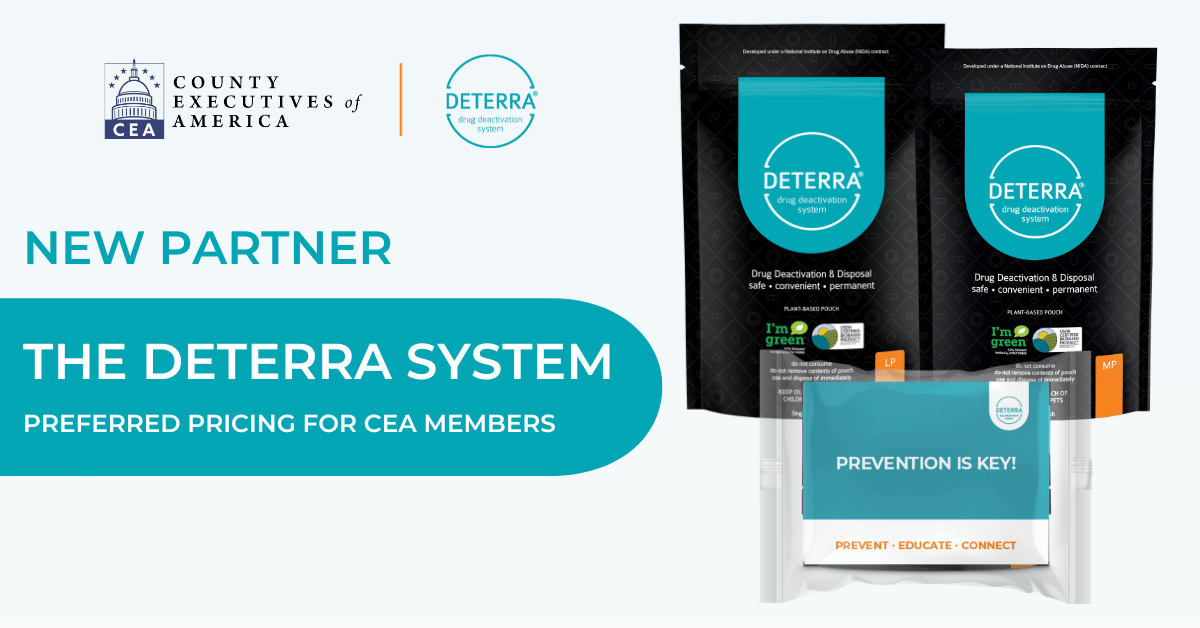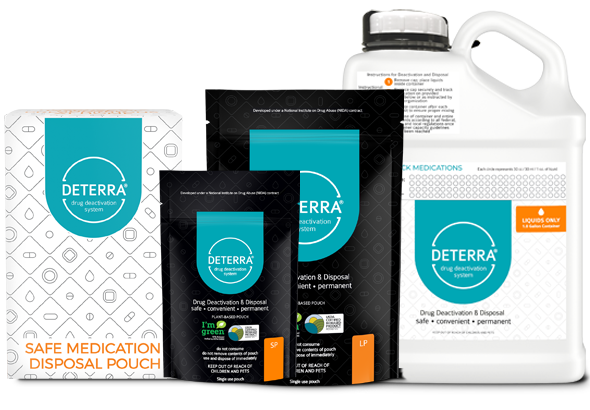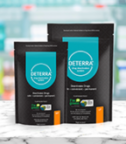
CEA Members Get Exclusive Pricing on Deterra
The Deterra® Drug Deactivation and Disposal System empowers everyone to safely destroy unwanted drugs – including opioids & fentanyl. CEA members receive preferred pricing on all Deterra products. Create a partner account to unlock your discount today.
Combat the opioid crisis with Deterra
Unused prescription drugs continue to fuel the opioid epidemic nationwide, but proper drug disposal can help prevent misuse before it starts. Deterra is the only at-home medication disposal system that permanently and irreversibly deactivates and destroys prescription and over-the-counter medications as well as most illicit drugs – including opioids and fentanyl.
Prevent Misuse & Protect the Environment
Improper disposal of medications can harm the environment and contaminate water systems. Deterra’s active ingredients and award-winning, plant-based packaging prevent harmful drugs from contaminating our natural resources, making the world safer for everyone.
Access to proper drug disposal is essential to prevent misuse. What sets Deterra apart from competitors is that it’s safe for the environment and helps prevent contamination of our natural resources.

An Evidence-Based Prevention Solution
The patented Deterra System deactivates prescription drugs, pills, patches, liquids, creams and films. Deterra renders them inert, unavailable for misuse and safe for the environment. CEA members receive preferred pricing on Deterra products – create an account to get started.
Safely destroy drugs in 3 EASY STEPS
In a simple 3-step process, a user deactivates the drugs by putting them in a Deterra pouch or container, adding water, shaking and throwing it away. It’s truly that simple.
Place Unwanted Drugs in Pouch
Open pouch and place unused medications inside.
Fill halfway with warm water
Fill halfway with warm water and wait 30 seconds. Foaming may occur.
Seal, Shake & Dispose in Trash
Seal tightly, gently shake and dispose of in normal trash.
Implement an At-Home Drug Disposal Campaign
Strengthening drug disposal programs is a core opioid abatement strategy. Counties across the country use Deterra’s Value Added Services to implement household mailing campaigns that raise awareness and empower everyone to safely destroy unwanted drugs as soon as they are no longer needed.
Household Mailings
Create a countywide prevention campaign with a household mailing of educational materials and drug deactivation resources. Request a free assessment to see the impact a household mailing can have on your community.
Available Funding
Deterra is an eligible expense for opioid settlement dollars and many grant opportunities. Learn more about funding options and get a free guide to securing funds for at-home drug deactivation and disposal.

Get Preferred Pricing
As a CEA member, you receive discounted pricing on the Deterra Drug Deactivation and Disposal System.
Fill out the form below to create a partner account and unlock preferred pricing on Deterra products.
Deterra System FAQs
The Deterra® Drug Deactivation System is a safe medication disposal pouch or container that can be used at home or in a clinical setting. It is the safest, most effective choice used to destroy and properly dispose of unused, unwanted, and expired medications with the simple addition of tap water.
Each patented Deterra Pouch contains a water-soluble inner pod containing proprietary activated carbon. Once the drugs are placed in the pouch, warm water is added, which dissolves the inner pod, releasing the activated carbon. Deterra works on pills, patches, liquids, creams and films allowing them to be adsorbed by the carbon, rendering them inert and non-retrievable for all practical purposes.
Read more about how Deterra works on our Science & Research page.
The Deterra® Drug Deactivation and Disposal System will deactivate organic medications including opioids, fentanyl, most illicit drugs and vape fluid.
However, Deterra will not adsorb biologics, such as vaccines and immunotherapeutics which are typically administered in a healthcare setting. Additionally, inorganic medications—such as antacids, lithium, and iron supplements—will not be adsorbed. Deterra will not deactivate leaf marijuana.
It is impossible to know all forms and potency of illicit drugs. Follow state and local guidelines on safe medication disposal where applicable.
If your medication has specific disposal instructions, please follow the directions as given. Consult authorities or your pharmacist for more specific questions.
Deterra is environmentally sound through the entire product life cycle. From using 100% wind-generated power in production of the plant-based pouches to the non-toxic organic ingredients to its innovative pouch design, the product:
- Provides a convenient and immediate alternative to flushing or discarding medications and prevents still-potent drugs from contaminating our water supply and landfills through activated carbon adsorption.
- Has a smaller carbon footprint due to its plant-based packaging. The packaging is USDA Certified, 50% or more bio-based, and has received the I’m green™ plastic certification.
- Deterra Pouches are manufactured in a factory built to LEED® Silver sustainable building guidelines on equipment powered by 100% wind-generated electrical energy and are printed using an Expanded Color Gamut Process to reduce ink consumption and waste.
- Deterra 1.0 Containers are comprised of 25% Post-Consumer Recycled (PCR) material.
To help educate users on the importance of proper drug disposal for the environment and how to use the Deterra® Drug Deactivation System, we offer free educational materials for consumers and dispensers. See resources.
Deterra is the pioneer for at-home drug disposal. Its propriety and patented technologies are supported by publicly available, third-party testing that proves it has enough activated carbon to permanently deactivate the amount of medication claimed on the label. Other carbon-based disposal products may not, leaving medications available for misuse and abuse. Additionally, some products suspend medications in a gel or other substance, which does not destroy the active ingredient, leaving it available for abuse, misuse and environmental contamination.
Deterra is officially endorsed by the DEA Educational Foundation and Community Anti-Drug Coalitions of America (CADCA) for unused drug deactivation and disposal.
Deterra is the only product that CADCA has endorsed in its 30-year history. Both CADCA and the DEA Educational Foundation cite Deterra’s strong scientific backing and proven effectiveness as reasons why Deterra products are trusted over other products on the market.
Updated FDA guidelines for drug disposal include at-home medication disposal products as a safe, convenient way to properly dispose of unused medicine.
Not everyone has easy access to drop-off sites. Rural communities, for example, have high opioid use. According to research from the American Academy of Family Physicians, those in rural areas had an 87% higher chance of receiving an opioid prescription compared to those in metropolitan areas, but rural residents are located further away from take back locations. Accessibility aside, some simply won’t use drop-off sites. Research published in JAMA Surgery found that less than 15% of patients given education on drop-off sites disposed of their drugs in that manner.
Deterra complements alternative disposal methods, like drop-off sites or throwing medications in the trash by offering a safer disposal option.
Common, but ineffective, methods of medication disposal include household trash or flushing down the drain or toilet. These methods harm the environment and maintain the integrity of the active drugs. Medications are not completely destroyed if you use these temporary methods – abuse can still occur.


